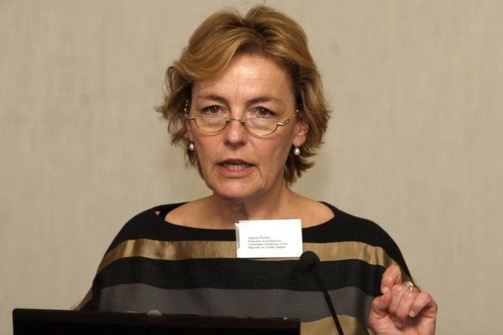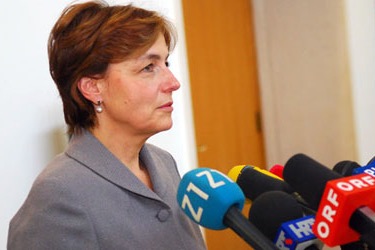Building a working consensus
Vesna Pusic and Croatia on the way to the EU
“I was absolutely adamant that people who were worse than me, and dumber than me, and crooks, unlike me, were not going to decide on my country and my life,” says Vesna Pusic about her step into politics in the mid-1990s. The former sociology professor has just become Croatia’s new minister of foreign affairs.
Born in Zagreb in 1953 to an English teacher and an internationally renowned law professor, Vesna Pusic, Croatia’s new minister of foreign affairs, initially appeared on track to follow in the footsteps of her liberal intellectual family. As a young woman in the late 1970s she became a co-founder of the first feminist organization in Socialist Yugoslavia. (In 2003 she would be elected “gay-friendly person of the year” by a Croatian web portal.) Pusic taught sociology at Zagreb University, obtained a doctorate in 1984, and became a professor in 1988. A year later, with the fall of communism, her life would be turned upside down.
“1989 was probably the freest year of our lives here. Not because there was a good government, but because there was no government … I never thought I would go into politics … but then in 1990 there was this feeling: ‘You could do anything!’ … And I went like so many other people into … this Democracy!”
In 1990 Pusic became a founding member of the Croatian People’s Party (HNS), a liberal party that claimed descent from its mid 19th century namesake. Today, the HNS is a member of the Liberal International and the European Liberal Democrat and Reform Party.
In the early 1990s it became clear that Croatian politics would be monopolized by Franjo Tudjman’s Croatian Democratic Union (HDZ) and its nationalist project. Though Tudjman had the backing of the relative majority of the Croatian electorate, it was still a minority of the entire Croatian population, Pusic explained.
“All the political parties were in some ways imitating Tudjman and the HDZ, or tried somehow being a lighter version of [it]. Maybe [it was] a childhood disease of democracy … They were all competing for the same segment of Croatia’s electorate, instead of going for the others. I was arguing then that we should go and do all kinds of things, but people mostly looked at me as if I had three heads.”
Pusic left party politics in 1992 and, with her friends Slavko Goldstein and Ozren Zunec, formed an association called the “Erasmus Gilde”, a “strange oasis at a horrible time,” as she puts it today. The group published a liberal journal called “Erasmus” and organized numerous public events. They wrote an open letter to Tudjman, asking him to resign because of his policies in Bosnia-Herzegovina. In 1993 they organised the first mixed Croat-Serb roundtable since the beginning of the war, bringing 14 intellectuals from Serbia to Zagreb.
“We were attacked by some of the journalists, who yelled ‘aren’t you ashamed of yourself’ and stuff like that. But it was a breakthrough. After that nobody who talked to the other side could be proscribed anymore. It was a great thing.”
While Pusic had retained her teaching post at Zagreb University, in 1996 she accepted a guest professorship at the School of Foreign Service at Georgetown University in Washington, DC. A year later she and her husband decided to move back to Croatia. Pusic also decided she would return to politics. “It became clear that gradually multi-party politics was going to become possible in Croatia,” she explained. “I was absolutely adamant that people who were worse than me, and dumber than me, and crooks, unlike me, were not going to decide on my country and my life.”

Tudjman’s HDZ lost the 2000 parliamentary elections. The HNS gained two seats. One of them was taken up by Pusic, who soon became the party’s president. The HNS joined the new government of Ivica Racan which broke with Croatia’s nationalist legacy and Zagreb’s meddling in Bosnia and Herzegovina under Tudjman. Croatia quickly overcame its international isolation and started to move towards EU accession. The key moment, for Pusic, however, came in 2004, when the HDZ, Tudjman’s party, returned to power under Ivo Sanader.
“They were in opposition and they were against the EU. They were very nationalistic, which in Croatia means very anti-Serb, and they were very much against Croatia’s cooperation with the ICTY, the Hague Tribunal [for war crimes committed in former Yugoslavia] … When Mirko Norac, a war criminal who was subsequently convicted of war crimes in Croatian courts, was on the run, they had a rally – some say 150,000, some say 200,000 people – in Split in 2001. Ivo Sanader gave the key speech: ‘We would not cooperate, we would not let our boys, etc., our generals stand trial.’
This was the atmosphere. And they won on that ticket. After they won, however, they turned around, or more precisely, Sanader turned around. He had enormous influence in his party for one reason: because he brought them back to power. And he turned his party around on three issues. They had been against Croatia’s membership in the EU; now they were for Europe. They had been against Serbs; now they were for Serbs – I mean in terms of having normal relations and respecting multiethnicity and respecting the institutions of the other ethnicities. And they [had been] against cooperation with the Hague [war crimes tribunal]; now they were for cooperation with the Hague.”
Sanader, who unexpectedly resigned as prime minister in July 2009 in the middle of his second term, is now on trial on corruption charges. “But regardless of that,” says Pusic, “these three things were and always will be his contribution to Croatia’s development … That has enabled us to build our first, and so far only, political consensus … And our first political consensus is on the EU.”
In 2007 Pusic was elected to head the National Committee for Monitoring the Accession Negotiations, which had been formed by Sanader and Racan in early 2005. It is a very interesting body. The committee is composed of 15 MPs from all parliamentary groups and 4 external non-voting members. In contrast to all other parliamentary committees, it works on the basis of unanimity. Each of the 15 voting members, therefore, has a de-facto veto on any and every negotiating position, and every modification thereof.
“The powers of the committee are crucial. And of course there is a risk. To speak quite honestly you have to be careful: you have the head of the committee and the people who are in the committee … they can disagree politically, but they have to agree on the fact that they want their country to become a member of the EU. There cannot be any kind of mavericks who will use their position in the committee to score three political points here or there, playing short-term political games. If you have that, you are dead. Then don’t have a National Committee. But if you have a sufficient number of people in opposition and Government who are seriously dedicated to this goal, [then it is very useful], however much they might disagree, and we disagreed on a lot of things … The whole process, I would say, also made us politically much more mature.”
In early 2011 it seemed that the completion of Croatia’s EU accession negotiations, envisaged for June of that year, would have to be postponed yet again. Pusic, as the head of the National Committee, invested a lot of energy and time to get everyone, including the president, prime minister, and opposition representatives, to meet in parliament.
“The purpose of the meeting was to demonstrate that we were all behind the project, to get a detailed account of what’s being done in the area of justice and fundamental rights [the main obstacle to concluding negotiations], to make sure that this [was] actually being pushed through, and to agree to visit EU member states presenting our case.”

The participants put together a group that included Pusic, Marija Pejcinovic Buric of the ruling HDZ, Neven Mimica, a prominent social democrat and former minister for European integration, and Milorad Pupovac, a member of the Serbian minority, to visit a few key countries. These included the Netherlands which, according to Pusic, “was always a very big problem and always very reserved” about Croatia joining the EU. Pusic and her group discovered that never before a parliamentary delegation from Croatia had visited the Dutch parliament.
“I couldn’t believe it, because if this is so important for you, if this is where supposedly all the obstacles are, then you make an effort to actually go and talk to people so that they see who you are. When you are an abstract, crazy Balkan people associated with killing each other with rusty spoons, that is one thing. When you go there and they see that you are more or less borderline normal, that you can be talked to, it’s a very different thing.”
The HDZ was defeated in parliamentary elections on 4 December 2011 by a coalition led by the Social Democratic Party. On 23 December Vesna Pusic became Croatia’s new Minister of Foreign Affairs.
Asked about lessons for other countries that are still awaiting the start of EU accession negotiations, she offers the following thoughts:
- “It was important early on to put together a team of people from different political parties who were personally in favour of the [EU accession] project and who were more or less presentable. Not only because it’s important to talk to the people in different European capitals, but because then you can impose this consensus on your parliament.”
- “The key thing here is trying to build a working consensus. But how you go about it, that’s much easier said than done. It’s important to distinguish between a declaratory consensus and a working consensus. And very often people try to trick you. They say, ‘We’re in favour of the EU more than you, etcetera.’ Somebody has to start. It has to be an atmosphere where it’s clear that there are some key individuals from different parties, [people] who have some influence … and then you go from there. It’s very important to show, at least at the beginning … that you are prepared to give in on certain things in order to achieve this goal. This builds personal trust among a small group of people.”
- “You have to have a pace. People will tell you – and it’s true – that if you stop for too long at one level, then people get frustrated, turn against the whole process because they feel it’s unfair. This is true throughout the process. But being inside the process is certainly much more motivating than being outside. Because if you’re waiting in the anteroom … after a while, people say … ‘It’s not going to happen. I am not going to stake my political career on this, even if I am in favour of it.’”
- “My message is ‘submit the application,’ especially if the EU is telling you not to. Then submit it. They were telling us not to submit it because it’s a pain in the neck.” (said in the context of Bosnia and Herzegovina)
- “And this is another lesson: our experience is that it is almost impossible for somebody to help you if you cannot help yourself first. You have to have something. Maybe you can’t resolve the whole thing, maybe you can’t get to the desired goal, but you have to have some initiative and some strength because then if somebody helps you, it falls on fertile ground.”



